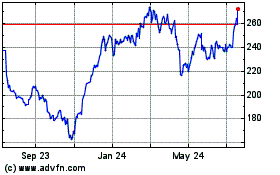By Jean Eaglesham and AnnaMaria Andriotis
Early this year, Phoebe Tu was rejected for a $30,000 loan to
consolidate her credit-card debt. Within days, the gears were
turning in a multibillion-dollar lending machine that enables
consumers to borrow and, more recently, has tried to profit as they
run into trouble.
The system is powered by the companies that compile credit
reports based on consumers' borrowing histories. These
credit-reporting companies typically sell the data to financial
institutions offering loans, but as consumer debt has risen,
another type of offer is being pitched to tens of millions of
households.
"You may be completely debt free in only 24-48 months," said a
typical mailer from New York-based National Debt Relief, which
added that the offer was based on a credit report.
Companies like National Debt Relief seek out heavily indebted
consumers with a promise to help them get out from under it. But
regulators say these debt-settlement programs can leave customers
worse off, facing high fees, damaged credit scores and unexpected
income-tax bills.
Steven Boms, an adviser to the American Fair Credit Council, the
debt-settlement industry's trade body, said most people who enroll
in debt-settlement programs already are behind on payments. "The
only real alternative many of these consumers have to
debt-settlement is bankruptcy," he said.
Consumer debt, not counting mortgages, hit a record $4.02
trillion this year, a big reversal after Americans aggressively
paid down what they owed and lenders wrote off unpaid debts
following the financial crisis. As borrowers have fallen deeper
into debt, the amount enrolled in debt-settlement programs has
risen sevenfold, from $1.7 billion to $12 billion in the five years
that ended in March 2017, according to a survey by the
debt-settlement industry's trade group.
Data from credit-reporting companies has been used by some
debt-settlement firms to solicit consumers as their debt is rising
and when many are trying to sort out their financial situation.
Other firms flood mailboxes with offers of loans, but when
consumers call, the pitch can be very different.
'Get the client's guard down'
Ms. Tu, a 33-year-old business development manager in the San
Francisco Bay Area, said that after she was rejected for the
personal loan, a mailing from GreenLink Financial LLC arrived
offering a loan of about $60,000 -- twice what she wanted -- and at
a surprisingly low interest rate. But when she called the firm, it
turned her down for the loan and pitched her a debt-settlement
program instead, she said.
"They said, 'It's to help you get by because you're in a
financial crisis.' I'm not in a financial crisis, just trying for a
low interest rate," she told The Wall Street Journal.
Former GreenLink employees said only a small number of people
who responded to the company's mailings were offered loans.
Instead, they were pitched a debt-settlement program that GreenLink
sells on behalf of San Mateo, Calif.-based Freedom Debt Relief, the
former employees said.
GreenLink's salespeople were taught to "get the client's guard
down," according to a GreenLink telephone sales script reviewed by
the Journal. The Journal couldn't determine the date of the
script.
Most people who responded to GreenLink mailers were told they
would be called back after loan-underwriting checks had been made,
the former employees said. On that second call, the salespeople
were told to say, "I couldn't stop thinking about your file" and to
pledge, "I am going to make YOU my top priority today," according
to the script.
Then, the consultants were told to break it to the caller that
he or she didn't qualify for the loan offer the company mailed, the
script said.
"But this actually turned out to be GREAT NEWS!" the salespeople
were instructed to say, according to the script, before pitching
the debt-settlement program that offers "a payment which fits
perfectly within your budget."
Responding to an online complaint on Yelp by Ms. Tu, GreenLink
wrote in May that its agent had "handled the call with utmost
respect." It added that Ms. Tu did "not meet the minimum
requirements needed to get approved for any loan with our funding
source."
In response to a complaint on the Better Business Bureau
website, GreenLink wrote that debt-settlement "is only an option
for clients that we can't qualify for a loan."
The company didn't respond to requests for further comment.
GreenLink, of Santa Ana, Calif., sent about 27 million mailers
last year, according to estimates from data-provider Competiscan,
up from about 1.2 million in 2015, the first calendar year after
the company was formed.
Freedom Debt Relief in July agreed to pay $25 million to settle
a civil lawsuit filed by the federal Consumer Financial Protection
Bureau that claimed it charged consumers without settling their
debts as promised, and misled them about fees. Freedom didn't admit
or deny the allegations.
A representative of Freedom Debt Relief, which describes itself
as the nation's biggest debt-settlement company, didn't respond to
requests to comment. National Debt Relief also didn't respond.
Consumers who sign up for these programs are often told to stop
paying their credit-card bills and other debts and instead put the
payments in a special bank account, regulators say. Then the
debt-settlement company negotiates with creditors to try to get
them to reduce the consumer's debt.
Halting payments, though, can trigger big penalties and
potentially lawsuits by creditors and can hurt a person's credit
score. Even if the company persuades a creditor to reduce the debt
-- and there is no guarantee of this -- the customer may owe income
taxes on the amount of debt forgiven.
Taxes combined with fees these firms charge of as much as 25% of
enrolled debt could wipe out any savings from a reduced debt
balance. And a lower credit score that the strategy can trigger
could make future borrowing more expensive.
The trade group's Mr. Boms said companies marketing loans often
discover information during the loan-underwriting process, such as
additional debts, that wasn't known when a mailer was sent. The
group said last year that a survey of its members found
debt-settlement plans reduced consumers' debts by an average of
$2.64 for every dollar they paid the firms in fees.
Alternatives to debt-settlement companies include nonprofit
credit counseling services, which attempt to work with the borrower
and creditors to agree on a debt-management plan. These plans
usually don't reduce the amounts owed; instead, creditors may agree
to lower interest rates or waive fees. Credit counselors may charge
fees for some of their services.
Legal gray area
At least some debt-settlement firms have used information from
credit-reporting companies to pounce on troubled borrowers. The
federal Fair Credit Reporting Act allows the companies, including
TransUnion, Equifax Inc. and Experian PLC, to sell the data from
credit reports only for certain uses, such as firm offers of
credit. Debt settlement isn't specified in the law as a permitted
use of this sensitive financial information to solicit consumers,
and some experts consider it a gray area.
Some firms use the data to pitch debt-settlement plans,
according to mailings reviewed by the Journal and lawsuits filed by
consumers. The lawsuits reviewed by the Journal all were settled
confidentially by the firms.
Other firms first offer loans and then shift their sales pitches
to debt settlement, according to former employees of the companies
and telephone sales scripts reviewed by the Journal.
Jeff Sovern, a law professor at St. John's University in New
York, said that, based on his reading of the Fair Credit Reporting
Act, it isn't legal to use consumer-credit reports for
debt-settlement solicitations since "that's not a firm offer of
credit." He added that the law requires credit-reporting companies
to obtain certification from the entities with which they share
such information that it will be used for a lawful purpose.
Credit-reporting companies that sell data used to solicit
debt-settlement services "bear some responsibility" for the
practices of some in that industry because they should be vetting
the firms they sell the information to and how those firms use it,
said Chi Chi Wu, staff attorney at the National Consumer Law
Center, a nonprofit consumer-advocacy group.
TransUnion told the Journal it no longer supplies credit-report
data to the debt-settlement industry. A spokesman said the company
"historically...has sold prescreen data" to some debt-settlement
companies, adding that this complied with federal law because these
firms allowed consumers to delay payments for their services --
which TransUnion said was a form of credit -- or because they
actually offered loans.
An Equifax spokeswoman said the company "does not, as a matter
of policy, provide consumer-report information to companies who it
knows to be charging advance fees for debt or mortgage-assistance
relief." The spokeswoman didn't respond to questions about whether
Equifax sells information to debt-settlement companies that don't
charge advance fees, a group that includes the biggest players in
the industry. By law, for-profit companies that sell
debt-settlement services over the phone are barred from charging
advance fees.
Experian said it has never sold information from credit reports
to the debt-settlement industry for solicitation purposes.
CreditAssociates LLC, a Dallas-based debt-settlement company,
said it stopped receiving data from TransUnion last year, but sent
offers to consumers based on the company's information as recently
as last month.
"You are preapproved for a debt relief program that can save you
thousands of dollars," said a mailer sent earlier this year by
CreditAssociates. "This 'pre-screened' offer of credit is based on
information in your credit report."
Rick Burton, a co-founder of CreditAssociates, said its
debt-settlement offer in the mailer qualified as credit because
clients can pay the fees it charges in installments, rather than a
lump sum. This approach was approved by TransUnion compliance
personnel, he said.
A TransUnion spokesman said it doesn't provide legal or
compliance advice to its customers and doesn't approve customers'
mailers.
Prof. Sovern called the practice of letting customers pay fees
in installments a "quite imaginative" way of using the fair-credit
law's provision allowing the use of credit-report data for loan
offers "for a completely different purpose of debt-settlement
offers."
Concern about credit score
In some cases, sales pitches for debt-settlement programs appear
to minimize the risk to a consumer's credit score. Amanda Ricchio,
a 34-year-old accounting student in Racine, Wis., was mailed offers
for loans after she put a few thousand dollars of college costs on
her credit cards. The offers said they were based on credit
reports.
Ms. Ricchio called Simple Path Financial LLC, of Irvine, Calif.,
but was refused the 4.99% loan she had been pitched. Instead, she
said she was offered a debt-settlement program, which she was told
would cause only a "slight hit at first" to her credit score.
Ms. Ricchio, who had worked for a credit union where her father
was chairman, said she didn't believe the claim. "I know this kind
of program would actually cause serious damage to my credit score,"
Ms. Ricchio said.
Mr. Boms, the adviser to the debt-settlement industry trade
group, said the credit scores of the "vast majority" of people who
enroll in the programs would fall due to their existing financial
problems, whether or not they go this route.
Simple Path was founded in 2016 by Bradley Smith and Branden
Millstone and sells debt-settlement plans from another firm founded
by the two men, public records show. Mr. Millstone in an interview
said a "very large number of people" who respond to Simple Path
mailers are offered a loan, adding that he didn't have the exact
numbers.
People who do qualify for a loan may choose debt-settlement as a
better option than "putting a Band-Aid on their situation" by
taking on more debt, he added.
--Lisa Schwartz contributed to this article.
Write to Jean Eaglesham at jean.eaglesham@wsj.com and AnnaMaria
Andriotis at annamaria.andriotis@wsj.com
(END) Dow Jones Newswires
August 10, 2019 08:13 ET (12:13 GMT)
Copyright (c) 2019 Dow Jones & Company, Inc.
Equifax (NYSE:EFX)
Historical Stock Chart
From Mar 2024 to Apr 2024

Equifax (NYSE:EFX)
Historical Stock Chart
From Apr 2023 to Apr 2024
